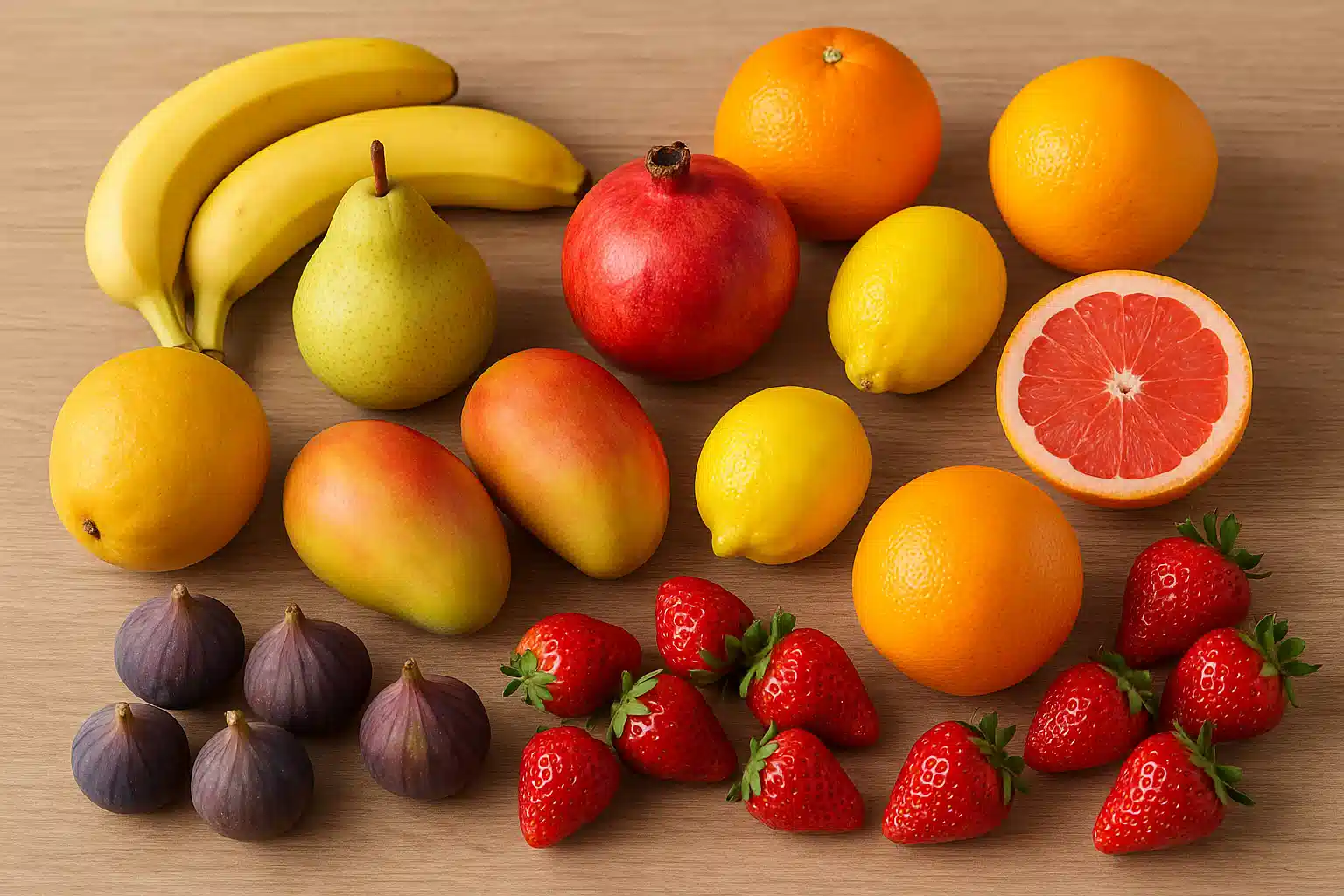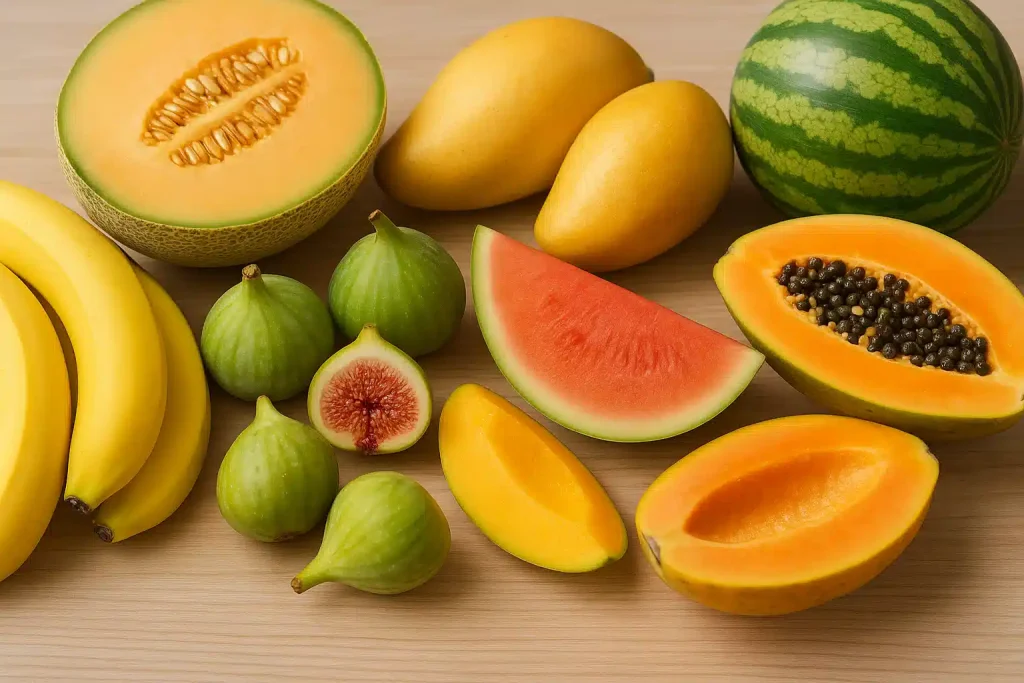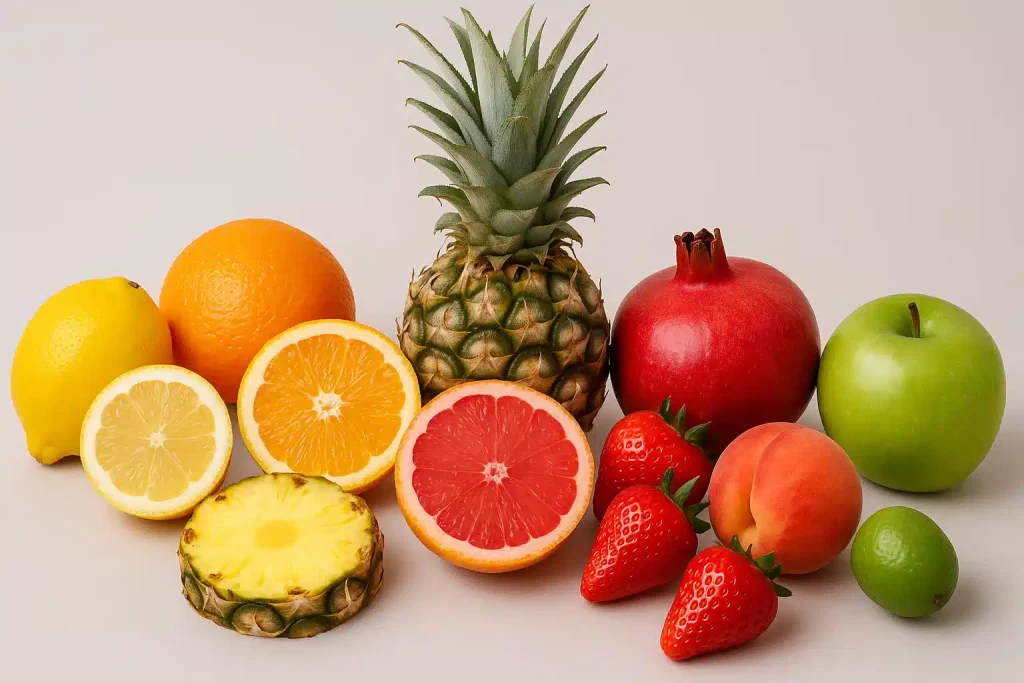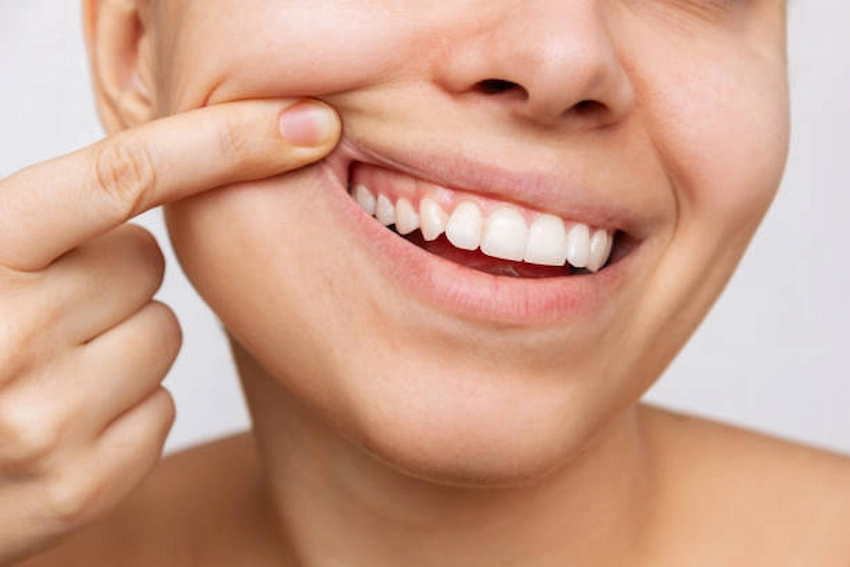🍓🥑 List of Non-Acidic and Acidic Fruits

Best to Worst for Your Teeth
When it comes to fruits, there is hardly anything that can even come close to them in terms of being rich in vitamins, fiber, and antioxidants, thus being, to put it simply, a vital constituent of a healthy diet. Even though this is the case, not all fruits are equally good for the health of your teeth since some fruits will be damaging to them, and some will be merely gentle. There are some fruits that contain too many natural sugars and acids that can lead to the slow intrusion of enamel damage in teeth over time. This means, knowledge about the acidity of fruits can help one make better choices.
✅ Non-Acidic Fruits (Gentle on Teeth)

The following are fruits that are less acidic and, as such, not harmful to the tooth enamel. These are fruits that you can eat every day without fear of harming the teeth, and, in fact, they may be even better since they assist in the formation of saliva that neutralizes some of the acids that the mouth may contain:
- Bananas – These are easily mistaken for being acidic, but they tend to be soft in structure, low in acidity, and rather rich in potassium and vitamin B6. They are a great snack whenever hunger strikes and will not put the teeth at risk.
- Melons (cantaloupe, honeydew, watermelon) – These types of fruits have high hydro-cooling capabilities, i.e., they can hold excess water, and as such, it helps to replace most of the fluid levels in the body since it rejuvenates and keeps the body fit and healthy.
- Papaya – times Papaya withstands low levels of acidity, thus it has a lot of other enzymes that assist in digestion. As little as one full cup of ripe papaya can be extremely pleasing, thus it also poses no threat to the health of teeth.
- Figs – They are one of the softest fruits, full of fiber and provide almost 5% of daily calcium needs. You can always be sure, though, that the figs will not harm the enamel of the teeth but rather leave a strong impression of dental safety.
- Mango – In contrast to various other tropical fruits, these fruits are somewhat frothy, mild, and low in acidity levels; they can be eaten without worrying that their enamel will be eroded with every bite into fresh pulpy slices of mango.
⤷Want to know what the acidity of papaya is?
❌ Acidic Fruits (Can Weaken Enamel Over Time)

The following fruits are negatively charged as they contain naturally occurring strong acids like citric acid, malic acid, or ascorbic acid. These strong, sumptuous, sweet, juicy fruits are loaded
- Lemons – These yellow citrus fruits are known for their sharp and tangy flavor. This fruit is extremely acidic, which is extremely bitter and sour and is taken either without any flavoring or as a juice. While they have several nutritional and medicinal benefits, they should not be overused as they may erode the enamel of the teeth if used for a longer period of time.
- Oranges – These delightful fruits, rich in vitamin C, are eaten not only for their sweetness but also for their wonderful juicy taste. Additionally, oranges contain citric acid, which can be detrimental to teeth when consumed in excess or over a long enough period of time. While this fruit is wholesome and contains fiber, it is important to eat it in moderation and observe good oral hygiene.
- Pineapple – This delicious fruit has a plethora of health benefits due to the presence of bromelain, antioxidants, and vitamin C. However, it has a very strong acid and citric acid, which is a concern for the ingestion of sour fruits that are favorable for the enhancement of the health and well-being of the body. It should be remembered that this fruit can be very acidic, with the risk of corrosion to tooth enamel should be prevented.
- Grapefruit – Despite the presence of citric acid, which might make them delectably sour, these fruits are not the most preferred foods for good teeth. A lot of citric acid in grapefruit is good for the tooth enamel. There are two ways to combat the problem of sour fruits: through moderation in terms of consumption and mindful eating.
- Pomegranate – As a red or purple fruit with a crisp texture, the health benefits offered by pomegranate are numerous. They are also rich in tannins, polyphenols, and other healthy elements and vitamins. However, the same phenomenon is quite similar to various other fruits that are acidic in nature and should be eaten in reasonable quantities to avoid the loss of the tooth’s enamel. In addition, drinking water after the consumption of such fruits would help wash away the harmful elements and keep the mouth healthy.
- Strawberries – These tasty red fruits are known for their shape and color, but they are also filled with many beneficial properties. Although they contain malic acid, strawberries are brokers among acidic fruits and have some protective effects on your teeth. With the knowledge of health advantages that strawberries feature, their ingestion should be done properly to avoid bad effects on teeth. In the case of problems, wise and correct consumption becomes a solution.
- Peaches – This fruit is surely delicious and is a great way of getting vitamin C with a mode of fractional acid that remains low. While the sourness is relatively mild, there is no way that an acid attack on the enamel can be completely prevented, even if there is a clear possibility that it can be corrected.
- Green apples – These are sturdy apple fruits that look similar to red apples but feel different while chewing since they are more tart and crisp than the red ones.
🍓 Tips to Reduce Acidic Impact from Fruits
Even if they are quite acidic, fruits can still be enjoyed without risking tooth enamel. Here are some guidelines on how to protect your teeth when consuming fruits:
- Pairing acidic fruits with alkaline foods like yogurt or cheese does not cause fewer instances of erosion and, in turn, neutralizes the acidic attack.
- Rinse your mouth with water immediately after eating fruit.
- Avoid brushing your teeth immediately after eating acidic fruits – wait for at least half an hour.
- Another strategy is to eat acidic foods (such as yoghurt or cheese), which will help the alkaline foods balance the pH and vice versa.
- When you drink fruit juices, you can use a straw to reduce contact with your teeth.
🍇 Conclusion from Lema Dental Clinic
Just as in life, there are sweets of nature, and yet they may not reciprocate the felicity when it comes to teeth; fruits can be the same. By always going for the non-acidic fruits and just limiting the intake of acidic ones, you can still keep a clean, fine smile while enjoying the health benefits of fruits.
Frequently Asked Questions
No. While fruits do contain natural sugars, non-acidic fruits like bananas and melons are gentle on your enamel and even help stimulate saliva, which protects your teeth.
Eating whole fruit is a better choice for your teeth. The fact that fruit juice is generally more acidic and sugary, and as a consequence, it exposes teeth to erosion more frequently, raises the risk of erosion.
Yes. Rinsing the mouth with water directly after the intake of acidic fruits is useful for the neutralization of the acids without the erosion of the teeth.
Bananas and melons would be the best choice for the avoidance of sensitive teeth because of their low acidity and soft texture.




